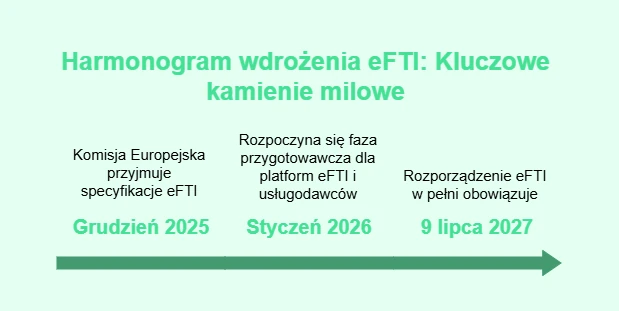EXPERT OPINIONS
The eFTI Regulation: The future of digital documentation in transport

Transport documentation and waste transport expert
Paweł Koszyński
"Not every haulier is a good partner - that's why it pays to know who to work with" - Paul understands perfectly how important it is to find reliable suppliers and hauliers who not only meet the legal requirements, but also care about the quality of service and punctuality.
In the digital age, many sectors of the economy have undergone a transformation, but freight transport still relies on paper documentation. This leads to delays, errors and increased operational costs. To address these challenges, the European Union introduced the eFTI (Electronic Freight Transport Information) Regulation (EU) 2020/1056, which came into force on 20 August 2020.
Looking for a solution to help you optimise your transport? Contact me
The aim of the regulation is to facilitate the digital exchange of information in freight transport, reduce administrative burdens and increase the efficiency and transparency of logistics processes. The mandatory acceptance of electronic documents by EU member state authorities will take effect from 9 July 2027.
Digitisation of transport documents: advantages and disadvantages of traditional solutions
Traditional, paper-based documentation in transport is unfortunately associated with many problems:
- The processes involved in issuing, transmitting and archiving documents are necessary but time-consuming.
- Manual filing increases the risk of mistakes, which can further lead to misunderstandings and penalties.
- The difficulty in tracking documents makes it difficult to monitor the supply chain.
The introduction of digital transport documents will bring numerous benefits:
- Electronic documents can be uploaded and processed instantly.
- Savings from eliminating paper, printing and document storage.
- The ability to track documents in real time improves control over logistics processes.
- Easier compliance with regulatory requirements through data standardisation.
However, full digitalisation requires investment in IT infrastructure and staff training, which can be challenging for some businesses.
Industry opinions: a practical look at the eFTI Regulation
How does the transport industry react to the eFTI Regulation itself? In the opinion of its representatives, will the solution they have introduced pass the test?
- points out Paweł Koszyński, owner of Innovation Trading Sp. z o.o., expert Ecologistics24
"Over my years in the transport industry, I have seen many situations where 'paper will take everything'. Drivers have often reported problems with paper documents - from errors to missing signatures to long waits. The introduction of electronic documentation is undoubtedly a step towards greater transparency and efficiency. Loading or unloading processes can sometimes be quick, but just waiting for documents could take hours. Digitalisation can change that."
- explains Łukasz Binkowski, freight forwarder and expert for Ecologistics24
"Electronic transport documentation will undoubtedly make many aspects of our work easier. However, as with any innovation, time will be needed for full implementation and adaptation. It is important that companies invest in the right systems and training. Now is the best time to do so. From a freight forwarder's perspective, standardisation and ease of access to data are huge advantages that will improve service quality and customer satisfaction."
We already know the opinions of the two sides, but what about the drivers themselves, who will, after all, be right in the middle of this digital turmoil?
- points out Bogdan Zarecki, driver with over 20 years' experience
"Mr Paul, I have travelled all over Europe and hauled various loads. I like to keep my paperwork in order, and so do you. I can't count the times I've had to wait for a signature because some forgetful person issued a document without one. You know that a CMR without a signature is a big problem. It is as if the goods have not arrived or have not been collected, depending on which signature is missing. If these EU plans work out and I can just click on the phone that I've picked up the goods and I can go on my way, that's fine with me."
- comments Zbigniew Sobulski, driver
"With paper documents there are problems alone. They can be lost, they can get destroyed, but with digital there won't be such a problem. I hope so, although who knows. It will probably take some time before it all works as it should. But I am of a good mind. I welcome any solution that makes work easier. Then the wolf will be free and the sheep free. That means the shipper and the unloader. I know it all looks good on paper at the moment and time will tell.
The eFTI Regulation: timetable for implementation of the new measures and industry sentiment

The transport industry is moderately optimistic about these changes. Many entrepreneurs see the benefits of digitalisation, but are concerned about the costs of implementation and the need to adapt to the new standards. Industry organisations are calling for support for small and medium-sized enterprises in adapting to the new requirements.
